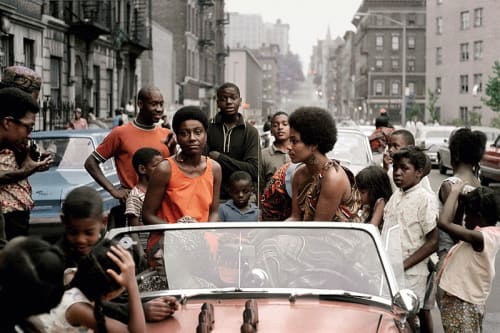About two and a half years ago, the Detroit Institute of Arts’ Nancy Barr was reviewing traveling photography exhibition proposals when one in particular caught her eye. It stood out for its beauty and insightfulness. She sensed she’d have to work quickly if she was to bring it to the DIA.
Thanks to Barr’s swift action, Black Is Beautiful: The Photography of Kwame Brathwaite opens in the museum’s de Salle Gallery Oct. 8 and runs through Jan. 16. The stirring collection showcases more than 40 large-scale color and black-and-white photos.
“I knew we’d have to scramble to secure a slot,” says Barr, the DIA’s James Pearson Duffy curator of photography. “This exhibit is getting a lot of buzz.”
Brathwaite, now 83, played a crucial role in the Black Is Beautiful cultural movement of the 1960s. That movement embraced Black culture and identity and called for an appreciation of the Black past as a worthy legacy. It also inspired cultural pride in contemporary Black achievements. Inspired by the movement, Brathwaite set out to document Black models, Harlem jazz clubs, Black-owned businesses, and other elements of the Black experience. “This is the first exhibit of its kind,” Barr says. “No one’s ever done a major survey of his work.”
Motivated by the writings of activist and Black nationalist Marcus Garvey, Brathwaite and his older brother, Elombe Brath, founded the African Jazz-Art Society & Studios (AJASS) and the Grandassa Models. AJASS was a collective of artists, playwrights, designers, and dancers. The Grandassa Models — the focus of much of this exhibition — was a modeling troupe for Black women, founded to challenge white beauty standards. The exhibition includes stunning studio portraits as well as fashion work and behind-the-scenes images of Harlem’s artistic and jazz communities.
“I’ve brought many exhibitions to the DIA and look for opportunities to showcase new voices and give space to artists of color in the museum’s galleries, so when I saw this, I fell in love with the story of its pieces and the story of Kwame,” Barr says. The exhibition was organized by the New York-based Aperture Foundation and Brathwaite’s son, Kwame S. Brathwaite, a California-based attorney and director of the Kwame Brathwaite Archive in Pasadena.
As the exhibit’s curator, Barr says she’d be hard pressed to choose a favorite photo. “There are a lot of gems in the exhibit,” she says. “I do love his jazz photography. There’s one of a man smoking in a ballroom in Harlem. He’s kicking back, smoking a pipe. I just love that one.” (She’s referring to “Man Smoking in a Ballroom,” shot in 1962.) “And I also love the Grandassa models, all in a car. That’s a great one.” (That would be “Grandassa Models at Garvey Day Parade,” taken in Harlem in 1965.)
Brathwaite shot most of his work on a Hasselblad medium-format camera, which, Barr notes, lends a particular magic to his photos. “When you’re shooting with a larger format you get that sense of real — like an analog moment,” an experience that digital photography can’t quite match, she says. “It’s like the difference between listening to music on vinyl and a digital recording. With vinyl, there’s that whole idea of fidelity and being in the room.”
As a result, viewers of Brathwaite’s photography will feel an overwhelming sense of time and place. “When you look at the works, you feel like you’re right there,” Barr says. “It’s like you’re in a time machine, in the streets of Harlem watching this stuff happen.”

